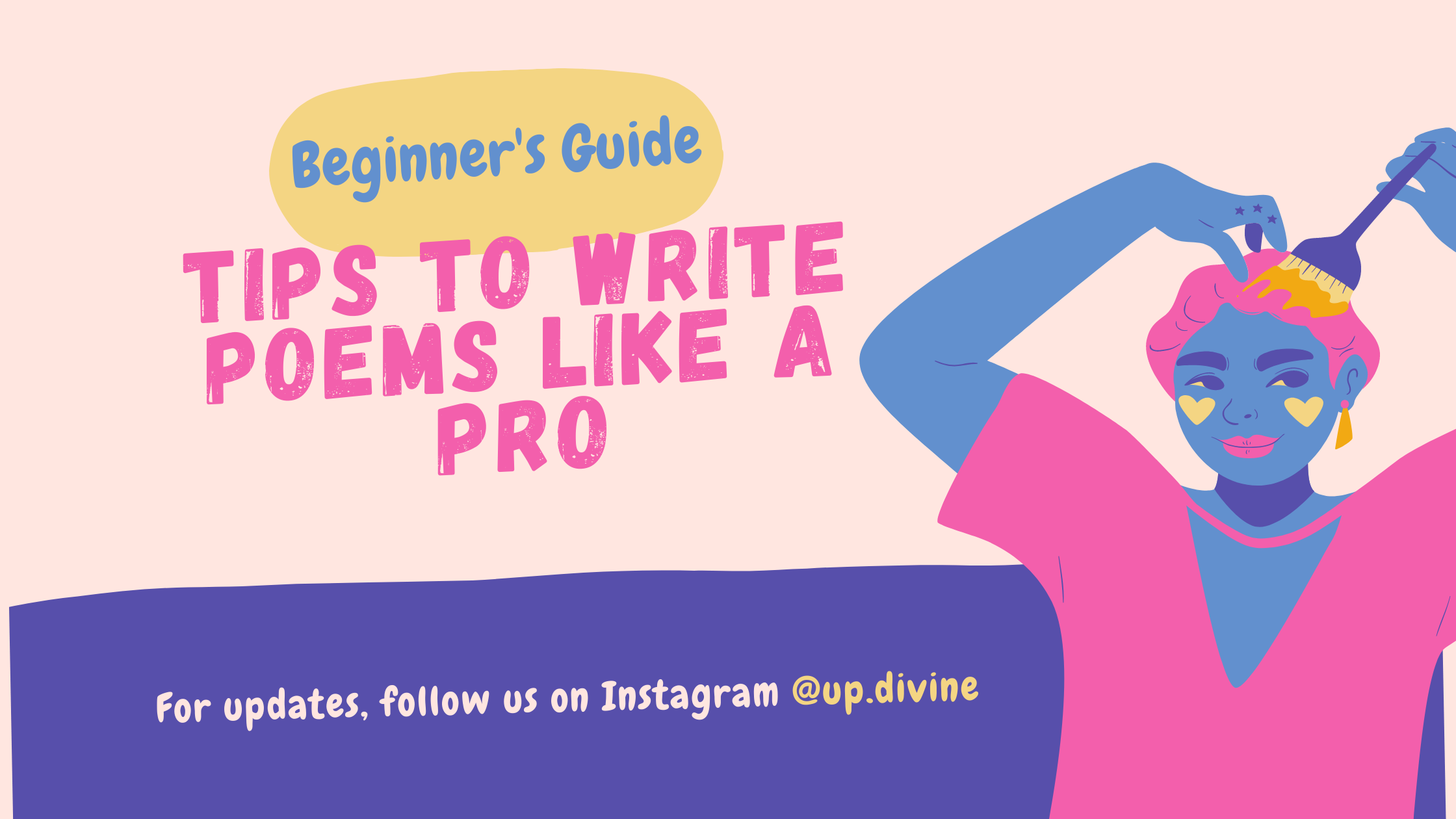Want to improve your writing skills?
If you are following us on Instagram, you must be aware that we are regularly sharing tips on how to improve your writing. And beginners guide to write poetry like a pro. For those who have missed it here are a guide, a list of do’s, and don’ts to help you improve your writing that communicates better with the readers.
So follow these steps and see the improvement in your writings.
Some Do’s & Don’ts – That Will Change The Way You Communicate
Clarity is the key
Yes, it is extremely important that you clearly know and understand what you want to communicate through your poem. It is absolutely important that you know your goals. Then only you can begin to communicate them with the help of some of the literary techniques.
So basically you have to find the purpose of your poem. It could be:
- to express a feeling,
- to give and an ode to someone or something,
- to protest something, etc.
Once you have clarity of purpose, you can string together using words to the poem. And once you have written the same, read it to ensure that it communicates the goals.
It is also extremely important to communicate the theme. The theme, as per the Merriam-Webster dictionary, is a “subject or topic of discourse or of artistic representation”. It is a “specific and distinctive quality, characteristic or concern”. The theme is not just a topic. It is an idea with an opinion.
For example, ‘the world war’ is a topic. And the statement, ‘war does not determine who is right – only who is left’, shows the theme.
The theme is not an event But a statement about the event. Use literary techniques to communicate the theme throughout the poem.
Avoid These mistakes
Avoid these things to make your poems less monotonous for the readers:
- Avoid Cliché. Avoid making use of the metaphors, theme plots, characters, and other literary elements that have already been overused. They make the poem boring for the readers. Always be innovative in your ideas, and original in your style. Creative and fresh ideas make readers ask for more.
- Avoid Being Overly Sentimental. Sentimentality, according to Merriam-Webster dictionary, is a “quality or state of being sentimental especially to excess or in affectation”. One should avoid a blunt appeal to the emotions of pity and love. Avoid overused subjects and pushing to an extreme such as heart-break, lovers, animals, etc.
The main reason for the same is that too much sentimentality detracts from the literary quality of your work. And, readers tend to deviate from the main issue, and the expected emotional response is not received. People get turned-off due to over-sentimentality. - Avoid Overuse of Abstract Words. Abstract words describe the concept of feelings that may not trigger the sensory organs. For example words such as ‘anxiety’, ‘love’, ‘horror’, etc.
Instead, you may use concrete words. Concrete words are the words that describe those things that can be experienced with the sensory organs. For example, words like ‘golden’, ‘floral fragrance’, ‘silky smooth’, etc.
So for example you can change the sentence “He became angry” to “A frown spread on his forehead along with a blue tint”. - Be Cautious With Rhyme. Rhyme and meter could be dangerous for beginners. An overused rhyme may make the poem sound like a nursery sing-song. So beginners can opt for free verse instead to avoid cliché.
Use These Techniques
Make use of these techniques to make your poems more pleasing to the readers.
- Use Imagery. As per the Merriam-Webster dictionary, imagery means “pictures produced by an imaging system”, “the product of an image-maker”, “figurative language”, or “mental images, especially the product of imagination”.
Poetry should stimulate six senses, I .e.e sight, hearing, smell, touch, taste, and kinesiology (motion).
For example, change from a simple sentence “the moon is shining” to “show me the glint of light on the broken glass”. And see the difference it makes in terms of creating a mental image on the readers. - Use Metaphors and Similes. A metaphor, as per the Merriam-Webster dictionary is “a figure of speech in which a word or phrase literally denoting one kind of object or idea is used in place of another to suggest a likeness or analogy between them (as in drowning in money)”. It is broadly classified as figurative language.
A simile, on the other hand, is a “figure of speech comparing two unlike things that are often introduced by like or as (as in cheeks like roses)”.
For example, ” she is an angel” is a metaphor. And, ” she is as innocent as an angel” is a simile.
Develop These Habits
A large part of virtue consists of “good habits”. Develop these small habits and see yourself become a better writer each day.
- Keep Revising. Remember your first draft is not always the final draft. So once you have finished the first draft of the poem, put it away for a few days. Then after a few days read it again. Does it look perfect? If yes, great. If not, revise it. Also, give your draft to others for a read. And ask them for suggestions and honest opinions. Incorporate the reader’s suggestions in your poems.
- Read A Lot. We suggest you read the famous poems by the finest writers ever. You can read them here. Look for the use of literary elements in their poems. Figure out how these poets communicated the theme of the poem. Read as much as you can. Compare your poems with these best poems. Find ways to make your poem better (at par with these poems). Follow reading habits. And I bet, you will see an improvement in your writing skills as well.
- Keep a Journal. A writer may find inspiration at any corner, during any time of the day. This happened to me a lot. But when I actually sat down to write, I used to forget what I wanted to write. Then I figured out, if I keep a journal handy, I could note the idea as and when it came to my mind. So I no longer had the problem of forgetting.
Besides, you can note anything, something you learned that day, your future plans, or anything. You can even note the things that you may not read again. But when you write down something, there are lesser chances of forgetting those things. - Try And Be More Imaginative. Of course, it is not in your hands. But there is a trick, “Subvert The Ordinary”.
Ordinary, as per the Merriam-Webster dictionary, is “of a kind to be expected in the normal order of events of common quality, rank, or ability; or deficient in quality”.
So all you have to do is, view the ordinary, just change the perspective. For example, a poet sees a two-year-old boy in a park. But he imagines him coming out of home after getting scolded for painting his toilet with his new painting kit.
Most important of all, never let the learner in you die. You should always try and learn the rules for poetry. Learn the literary devices. So when next time you hear someone talk about the pentameter, the iambics, etc., you know what they are talking about. You may only be a casual poet, but you owe it to yourself, your poetry, and your readers to learn something new. This might sound really boring. But trust me, it is the best advice of all the above.


Ok